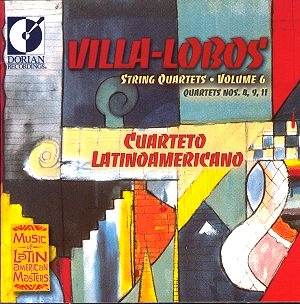 Heitor Villa-Lobos (1887-1959) String Quartets – Volume Six
Heitor Villa-Lobos (1887-1959) String Quartets – Volume Six
Cuarteto Latinamericano
Recorded 1998, Dorian Recordings DOR 93229 [79: 23]
String Quartet No. 4 (1917), String Quartet No. 9 (1945), String Quartet No. 11 (1948)
In the extensive oeuvre of Heitor Villa-Lobos, his string quartets stand as a testament to his remarkable ability to weave intricate textures with a profoundly personal idiom. Volume Six of the Dorian Recordings series, featuring the Cuarteto Latinamericano, showcases three pivotal quartets from distinct phases of the composer’s development. The recording offers an opportunity to explore how Villa-Lobos’s style evolved while retaining a connection to his Brazilian roots.
The String Quartet No. 4, composed in 1917, emerges as a quintessential work of the composer’s early maturity. From the outset, the leisurely Allegro captivates with its melodic fluidity and lyrical expressiveness. The Cuarteto Latinamericano’s interpretation breathes life into each phrase, deftly navigating the nuances of the melodic lines that are steeped in Brazilian folk influences. The performers exhibit a keen sensitivity to the pianissimo moments, particularly in the slow movement, which, drawing from Villa-Lobos’s ballet Uirapuru, evokes a serene landscape. This movement serves as a therapeutic interlude, expertly rendered with a hushed intimacy that invites deep contemplation.
Contrastingly, the Scherzo bursts forth with an effervescent spirit that channels both virtuosity and playfulness, a nod to the composer’s penchant for rhythmic vitality. The ensemble’s precision in articulating the rapid passages is commendable, creating a delightful interplay reminiscent of the innocence of youth. The finale, structured in classical form, is marked by directness and clarity; the Cuarteto’s interpretation allows the listener to appreciate the structural integrity of the work.
Turning to the String Quartet No. 9, composed in 1945, we encounter a shift towards a more introspective and intense character. The opening scherzo is not merely a whimsical interlude but rather a complex tapestry of interwoven motifs that demands careful attention. Here, the ensemble navigates the intricate rhythms with impressive cohesion, revealing the underlying tension that characterizes this period of Villa-Lobos’s output. The slow movement, often cited for its profundity, transcends mere description; it resonates with emotional weight, exploring themes of solitude and reflection. The performers manage to imbue this movement with a haunting quality that lingers long after the last note fades.
The concluding String Quartet No. 11, a work from 1948, represents a stylistic pivot towards a lighter, neo-classical idiom. Critics may debate the merits of eclecticism in composition; however, Villa-Lobos’s versatility is a hallmark of his genius. The Cuarteto Latinamericano embraces the work’s whimsicality, particularly in the spirited scherzo, which juxtaposes lively rhythms against tender motifs. The final movement’s blend of elegance and technical prowess culminates in a delicately wrought conclusion, showcasing the ensemble’s ability to balance virtuosity with lyrical beauty.
In terms of recording quality, Dorian Recordings offers a crisp and vibrant sound that complements the ensemble’s performance. The engineering captures the tonal richness of the quartet, allowing the listener to appreciate the subtleties of each instrument’s voice. The spatial balance is commendable, with the depth of sound inviting an immersive experience that draws the listener into Villa-Lobos’s world.
Historically, these works reflect the composer’s journey through the tumultuous landscape of the 20th century, interspersed with the rhythmic and melodic influences of his homeland. The quartets not only offer a window into Villa-Lobos’s creative evolution but also serve as a rich tapestry that intertwines the familiar with the innovative.
In conclusion, Volume Six of Villa-Lobos’s string quartets, as performed by the Cuarteto Latinamericano, is a commendable addition to the existing discography. The ensemble’s interpretations highlight the intricate interplay of tradition and innovation that defines Villa-Lobos’s legacy. This recording is highly recommended for both seasoned listeners and those seeking to explore the depths of one of Brazil’s most significant composers. The combination of historical significance, interpretative insight, and technical excellence makes this volume an essential listening experience.